Diary of Anais Nin, Volume 2 Read online
The Diary of Anaïs Nin
VOLUME TWO 1934–1939
Edited and with a Preface by Gunther Stuhlmann
* * *
A Harvest Book
The Swallow Press and
Harcourt Brace & Company
San Diego New York London
* * *
Copyright © 1967 by Anaïs Nin
Preface copyright © 1967 by Gunther Stuhlmann
All rights reserved.
No part of this publication may be
reproduced or transmitted in any form or by any means,
electronic or mechanical, including photocopy, recording,
or any information storage and retrieval system,
without permission in writing
from the publisher.
Requests for permission to make copies
of any part of the work should be mailed to
Permissions Department,
Harcourt Brace & Company, 6277 Sea Harbor Drive,
Orlando, Florida 32887-6777
Library of Congress Catalog Card Number 66-12917
ISBN 0-15-626026-3 (pbk)
Printed in the United States of America
S T U V W
* * *
Preface
When Anaïs Nin's Diary: 1931–1934 appeared in the spring of 1966, Karl Shapiro, the Pulitzer Prize-winning poet, wrote in Book Week: "For a generation the literary world on both sides of the Atlantic has lived with the rumor of an extraordinary diary. Earlier readers of the manuscript discussed it in breathtaking superlatives as a work that would take its place with the great revelations of literature. A significant section of this diary is at last in print and it appears that the great claims made for it are justified."
Indeed, the reception of the first volume showed that Miss Nin's enormous lifework, which for various reasons may defy publication in its entirety, did not lose its impact and uniqueness in the inevitable fragmentation of partial presentation. For even the sizable segment of this first volume, covering a little over three years in Miss Nin's life, encompassed merely some 600 pages of the 15,000-page transcript of the original diary volumes, which today fill two four-drawer filing cabinets in a Brooklyn bank vault.
To choose from a cohesive, organically developing text like that of the diary, with its weaving and reweaving of time and incident, its natural gaps and duplications, its gradual maturing, is always a precarious undertaking. The author's own initial selectivity in writing her diary is re-enacted, for the second time, in the editorial process. And the original diary itself, in all its fullness, after all is merely a reflection, a refraction, of the totality of the author. It is not the full, rounded, day-to-day Anaïs Nin portrayed in place and time with an eye toward presenting herself to the world. In her unabashed, sometimes unflattering exposure of the inner person, of her spontaneous reaction to people, events and ideas, Miss Nin takes us into a confidence undisguised by the art of the writer. But it is her very gift and skill as a writer, even in her early years, that breathes vibrant life into the pages of the diary, that gives even to the fragment the sweep and impact of a unified whole. Wherever we pick up the diary we are caught, as it were, in the novel of her life, a novel that moves instinctively, logically, like a dream, with its own rhythms, tensions, actions and counter-actions.
The first volume opened at the time Miss Nin was about to make her literary debut with a brief, passionate study of D. H. Lawrence. She was then living, with her family, in an ancient, shuttered house in the sleepy village of Louveciennes, on the outskirts of Paris. But the surface calm of this rural setting—after the glamorous turmoil of Miss Nin's Catholic childhood in Europe and the trying years of her exiled youth in the United States—was soon shattered by her growing, intense involvement with a host of artists and intellectuals, foremost among them the then unknown "gangster-author," Henry Miller, his remarkable wife, June, and the fevered surrealist poet, Antonin Artaud. Pressed into many self-imposed, multilateral roles as artist, wife, sister, daughter, caretaker, muse, confidante and glamour-girl, she found herself trapped between the polished vacuity of "society" and the abrasive freedom of "Bohemia." Pursued by an often excruciatingly painful self-awareness, and haunted by the elegant, egotistical shadow of her father, the Spanish composer-pianist Joaquin Nin, who had deserted the family in her childhood, she tried to understand and untangle through analysis the many strands of her personality. But neither Dr. René Allendy, the founder of the French Psychoanalytical Society, nor Sigmund Freud's banished pupil, Dr. Otto Rank, with whom she explored both the role and the creative possibilities of woman in the modern world, could provide her with more than partial answers. In her refuge, the diary, which she carried with her like a magic amulet, she analyzed the analysts. In November 1934, at the end of Volume I, two months after Henry Miller, with her steadfast support, had published his first book, Tropic of Cancer, she was about to leave Paris. Dr. Rank, driven by the Depression to shift his practice to New York, had urgently called her to join him for a time in his work in the United States.
The present volume continues the diary directly with Miss Nin's arrival in New York. Like the first, it is a self-contained unit, bounded by events which, both externally and internally, mark significant changes in Miss Nin's life and provide a natural framework within the over-all flow of the diary.
The text of this volume represents about half of the original diary manuscripts—volumes 40 to 60—covering the period from 1934 to 1939. Certain people, including Miss Nin's husband and members of her family, again had to be eliminated. The names of some of her analytical patients had to be changed or omitted, and the dates provided by the editor merely summarize the specific and—due to Miss Nin's later reflection on a previous event—sometimes confusing dates in the originals.
If there is a difference, a slow shift in emphasis, between this and the previous volume, it is, perhaps, a move away from introspection, a strengthening of Miss Nin's stance82 vis-à-vis the outside world. To be sure, Miss Nin's critical lens still focuses sharply and candidly upon herself: "What I like best about myself," she writes, "is my audacity, my courage. The ways I have found to be true to myself without causing too much pain or damage.... What I hate so much is my vanity, my need to shine, my need of applause and my sentimentality. I would like to be harder. I cannot make a joke, make fun of anyone, without feeling regrets." But her need, the confessional function of the diary, is changing. She has slain the ghost of her father, though she still seems to be instinctively looking for a "leader," a father figure. Her attitude toward Henry Miller and his Bohemian friends is undergoing a change. She is less tolerant of people's eccentricities, of the waste of talent. Her involvements with her own work, with Gonzalo, the wild Indian revolutionary, and his wilting wife, Helba, with the young Lawrence Durrell, acquire a new dimension, a new solidity. She still "cannot stay quietly rooted anywhere because of the many sides of myself constantly sprouting, the layers of latent mysteries, the things I am not yet." She still is caught in the web of her different personae, but the world, somehow, is becoming more real, more tangible, the choices clearer.
"The diary," she writes in the late 1930s, "was once a disease. I do not take it up now for the same reasons. Before it was because I was lonely, or because I did not know how to communicate with others. I needed the communion. Now it is to write, not for solace but for the pleasure of describing others, out of abundance."
Her inborn technique, the selective eye of the earlier diary, which gave such urgent immediacy to the previous volume, is becoming more and more a conscious artistic principle: the captured moment of intense emotional reality. Her "portraits," she explains, were done only "at the moment when a person was impo
rtant to me. The person rises and sinks, appears and vanishes only in relation to me." The external narrative, the merely descriptive, remains fragmentary. "It's like a statue without arm or hand, unearthed, and having to be deciphered, divined." Thus, when she arrives in New York, the characters who so intensely peopled her Paris life fade before the onrush of new situations, new entanglements. Her diary bulges with the stories of her analytical patients. When she returns to France, having been forced to choose between the analytical profession and her need to create as a writer, the same process involves her New York friends. They flash onto the diary screen only at the heightened moments of concern, of actual, emotional contact.
The shift in emphasis in this volume, the change in the purpose and function of the diary, perhaps also reflects the growth of Miss Nin's instinctive awareness of the inevitable choice facing the individual, and especially the artist, in the modern world. Confronted with the gathering political storms in Europe, with the Spanish Civil War, that bloody dress rehearsal of the horrors to come, she confesses: "I have not been unaware of the political drama going on, but I have not taken any sides because politics to me, all of them, seemed rotten to the core and all based on economics, not humanitarianism. The suffering of the world seemed to me without remedy, except by what we could give individually. I did not trust any movement or system." And even as she actively engages her sympathies, while she attends rallies and types out letters for the Loyalist cause, she cannot shed her basic political pessimism that "nothing changes the nature of man. I know too well that man can only change himself psychologically, and that fear and greed make him inhuman, and it is only a change of roles we attain with each revolution, just a change of men in power, that is all. The evil remains."
As a woman, as an artist, she has made a choice that reaches back perhaps to the solitude of her childhood: "I have built a private world, but I fear I cannot help build the world outside." Yet her choice is not a mere retreat from the uncontrollable. It is an act of defiance, an optimistic staking out of a corner that is "livable" in her own terms. As a friend, a listener, a supporter of what she deems worthy of support, she has engaged herself in a private struggle against the evils of man's fear and destructiveness. Louveciennes, the tear-stained hotel room in New York, the houseboat on the Seine, touched by her personal magic, become exemplary islands in a troubled sea. Living fully, richly, and concerned about others within the means of her own capabilities, Miss Nin provides her own answer to the dilemma of human existence. Following her reflection in the intricate labyrinth of the diary may provide others with a key to the vast chambers of the self that await exploration. For, as Miss Nin so aptly writes: "The personal life deeply lived always expands into truths beyond itself."
New York
November 1966
GUNTHER STUHLMANN
[November, 1934]
My ship quite fittingly broke all speed records sailing towards New York. It was night when I arrived. The band was playing, and the skyscrapers were twinkling with a million eyes. I was looking for Dr. Otto Rank on the wharf, staring at the Babylonian city, the tense people, New York a dream wrapped in fog and sea smells.
Rank was there. Through the influence of a powerful patient of his, the formalities were quickly disposed of and I was whisked away, baggage and all, into a taxi and to a room reserved for me at what I immediately called the "Hotel Chaotica."
We sat at the bar. His pockets were filled with theatre tickets, his arms with books for me. He had plans for every evening in the week. He had made an appointment for me with George Balanchine because I had spoken once wistfully of wishing to take up dancing again.
From where we sat I could see all of New York pointing upward, into ascension, into the future, to exultation, New York with its soft-oiled hinges, plastic brilliance, hard metal surfaces, glare and noise, New York gritty, sharp and windy, and the opposite of Paris in every possible way.
For Rank it is a new life. His days are already overfull.
The very next morning I was at the Adams, where he has his office, both to learn and to help him. Famous people came there, sat in his waiting room. Presents came from grateful patients, tickets to opening nights, the opera, invitations to new restaurants, new schools. He displayed these with pride, as if he had gained control of the life of the city, and I felt immediately at the center and inside of all activities, where I love to be.
In the evening he took me to see the magic doors at Pennsylvania Station, which opened as one approached them, as if they could read our thoughts, and then the Empire State terrace, which seemed to sway in the wind, so that I could see the panorama. It was beautiful and strong, the whole design a thrust into space, arrogant sharp pointed arrows piercing the sky as if seeking to escape from the earth into other planets.
In New York the acoustics are good for laughter, for life is all external, all action, no thought, no meditation, no dreaming, no reflection, only the exuberance of action. No memory of the past, no looking back, no doubts, no questions.
The plays were one-dimensional and prosaic. Rank and I played at an imaginary rewriting of them as they should have been. In between he talked a great deal about his love of Mark Twain, of Huckleberry Finn in particular, on the theme of freeing of the Negro with emphasis on the adventurous spirit. Rank admired Mark Twain's parody of literature, Huck's search for complications, additions, circuitous ways. "No, that would be too simple, it's not the way it's done in books."
Rank's office is a three-room apartment on the East Side, near the Park. I became familiar with each patient who came, studied their charts with Rank, and he taught me how to handle each case. He explained his method of dynamic attack, his seizing of the present conflict, immediacy, a quick-moving progression from present conflict. He demonstrated every step, every pattern. Every talk was full of suspense. He believed the neurotic was like a paralytic, emotionally, and that he should not be allowed to stand still dwelling on his impotence.
Perhaps because the life of New York was so intensely active, events seemed accelerated and the atmosphere changed from day to day, but the temperament of Rank's dynamic analysis also seemed to accelerate his patients.
Suddenly I was in the heart of political intrigues, at the core of the life of the opera, the theatre, the millionaires, the movie stars, the Foundations and Fellowships. I could not reveal their names (it would have been unethical) but their stories fascinated me as a novelist.
Curtains rise on plays far deeper and more terrifying than any play or film. Behind the great powers, tragedy, frustration, fears, bitterness. Death by suicide, death by psychological murder. All day I hear them whispering in the closed office. I sit in the smaller room, studying and making notes. A symphony. I open the door to a man who holds in his hands the destiny of the opera, another who is building a chain of hotels, another who can influence Wall Street stocks. A thousand stories.
Rank is beginning to love his life here, but more, as he said, when I look upon his work as a novelist, when I respond to the dramas and surprises. His delving reveals new plots and new aspects of character.
The deeper I enter, through him, into the lives of these characters, the more like a synthetic symphony they seem outside, in the streets, in the restaurants.
The transparent brilliance over all things, from shop windows, to cars, to lights. A texture which is not real, and not human. Days all bright and glossy. One feels new every day. The poetry of smooth motion, of quick service, a dancing action, at counters, changing money for the subway. Rhythm, rhythm, rhythm. After knowing what seethes within them, I do not dare to look at the people too closely, for they seem a bit artificial, like robots, parts of concrete and electric wiring. A million windows, high voltage, pressure, vitamin-charged, the city of tomorrow, and the people of tomorrow who cannot be human beings, and who, perhaps knowing it, come to Dr. Rank to weep and complain for the last time, for they too may be a vanishing race. Just as the aristocrats are a vanishing race in Europe, perhaps here th
e human being who thought this was to be his world, is also being sacrificed to something else. Here in Dr. Rank's office I hear protests, revolts, sorrow, but outside they seem a part of the white-enameled, sterile buildings.
I gave up the idea of dancing with Balanchine's class, to concentrate on this new art, the art of exploring human beings at a deeper level, archeology of the soul.
Anaïs, the assistant secretary, is not very efficient. But Rank is tolerant because I make up for it by understanding his ideas. In fact, I understand them so well that now he wants me to work on the translations made of his books, to work on elucidations, because in some of these rough, direct translations from the German there is a ponderous quality which makes his ideas obscure.
My small desk is weighed down with huge books with German titles. Work for a lifetime. Every day the translator brings what he has done and I rewrite it in a clearer way.
At six o'clock all work ends. We go to a restaurant. We talk about the patients. Rank cannot help teaching all the time, for his interpretative mind is constantly at work. I tire of abstractions after a while, so I suggest Harlem.
Harlem. The Savoy. Music which makes the floor tremble, a vast place, with creamy drinks, dusky lights, and genuine gaiety, with the Negroes dancing like people possessed. The rhythm unleashes everyone as you step on the floor.
Rank said he could not dance. "A new world, a new world," he murmured, astonished and bewildered. I never imagined that he could not dance, that he had led such a serious life that he could not dance. I said: "Dance with me." At first he was stiff, he tripped, he was confused and dizzy. But at the end of the first dance he began to forget himself and dance. It gave him joy. All around us the Negroes danced wildly and gracefully. And Rank sauntered as if he were learning to walk. I danced, and he danced along with me. I would have liked to dance with the Negroes, who dance so spontaneously and elegantly, but I felt I should give Rank the pleasure of discovering freedom of physical motion when he had given me emotional freedom. Give back pleasure, music, self-forgetting for all that he gave me.

 Diary of Anais Nin, Volume 5
Diary of Anais Nin, Volume 5 A Spy in the House of Love
A Spy in the House of Love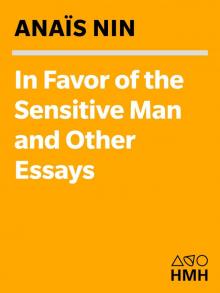 In Favor of the Sensitive Man and Other Essays (Original Harvest Book; Hb333)
In Favor of the Sensitive Man and Other Essays (Original Harvest Book; Hb333) Collages
Collages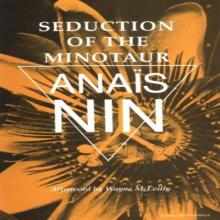 Seduction of the Minotaur
Seduction of the Minotaur Children of the Albatross
Children of the Albatross Delta of Venus
Delta of Venus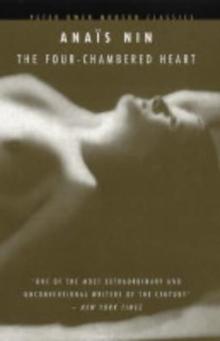 The Four-Chambered Heart coti-3
The Four-Chambered Heart coti-3 Diary of Anais Nin, Volume 2
Diary of Anais Nin, Volume 2 Diary of Anais Nin, Volume 1
Diary of Anais Nin, Volume 1 Diary of Anais Nin, Volume 4
Diary of Anais Nin, Volume 4 The Winter of Artifice
The Winter of Artifice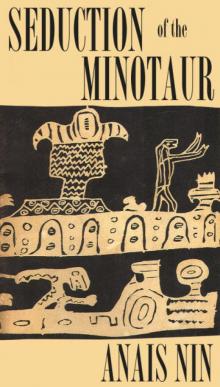 Seduction of the Minotaur coti-5
Seduction of the Minotaur coti-5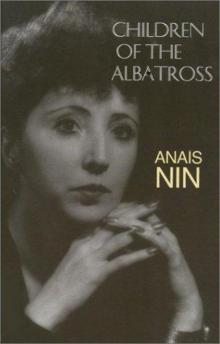 Children of the Albatross coti-2
Children of the Albatross coti-2 Henry and June: From A Journal of Love -The Unexpurgated Diary of Anaïs Nin (1931-1932)
Henry and June: From A Journal of Love -The Unexpurgated Diary of Anaïs Nin (1931-1932) Ladders to Fire
Ladders to Fire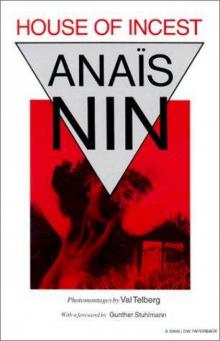 House of Incest
House of Incest